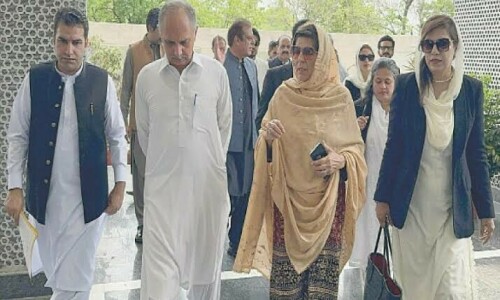WHO would’ve thought a phone call from a journalist asking to write an anonymous column called ‘Single Women Over Thirty’ (SWOT) would lead to a) a trailblazing column in the then midweek magazine ‘The Review’ celebrating female agency and b) a lifelong friendship?
That is what happened when journalist Sahar Ali showed up at Dawn in 2001 or 2002 — forgive my memory.
This is pre-social media, when people read newspapers and its magazines and word of mouth played a big role in some pieces gaining more traction. There was no concept of virality. Feedback came in the form of letters, emails and phone calls.
When SWOT started, some were not sure — it wasn’t for Dawn readers, they told editor Saleem Asmi who, bless him, disagreed because he understood times were changing, albeit at a snail’s pace.
To be fair, I understood the reluctance; it was progressive at a time when a single woman was viewed as a spinster or a financial burden or an oddball, something was wrong with her if she was still single. Women all over are seen through the lens of marriage and motherhood, anything challenging that makes her the problem.
The decline of marriage is a global trend.
SWOT lived life by her rules and wasn’t marriage-obsessed. She had supportive parents who told her to live life the way she deemed fit, taught her to be financially independent and supported her when she, for example, moved to Islamabad for a job and lived by herself. Most importantly, SWOT was funny and laughed at herself as well as social norms.
SWOT wasn’t the first per se. Readers may remember the equally brilliant Girl Friday column(s) at The Friday Times weekly but their reach was not as vast as Dawn’s. SWOT developed a cult-like following — pre-social media — where readers waited for her next column.
It’s remarkable how SWOT’s identity managed to be kept under wraps. I once ran into columnist Ardeshir Cowasjee in the hallway, he was waving his walking stick at me as he said “chokri, admit it’s you.” I told Asmi sahib later that day and he admitted he was now a SWOT fan and also wanted to know who she was. Sahar ‘outed’ herself in another paper, a decade later.
You can understand then that this (sort of) buzz wouldn’t go down well with traditionalist readers not used to seeing happy women in print. Little has changed today except of course it is far more common to see happy single women all over the world, rejecting roles expected of them. It is a result of rising literacy rates, financial independence and global exposure courtesy the internet. The decline of marriage is a global trend with one claim that 89 per cent of the world lives in countries with falling marriage rates. The median age for first marriages has risen.
I was reminded of SWOT after watching Americanish, a movie by Iman Zawahry which will soon screen in Pakistan. It is about three young women pursuing their ambitions but, as immigrants, also trying to straddle both the worlds. We have two sisters living with their mother, whose father/ husband walked out on them when they were young. The mother wants her children to settle while the elder daughter, played well by Aizzah Fatima, a communication professional, wants to move out and live independently. The younger one wants to go to Harvard medical school but has to make a tough decision when her fiancé asks her to sacrifice her dream.
Then there is their cousin from Lahore who arrives in New York City with the sole purpose of meeting a doctor to marry, never mind that she likes someone else. Let me warn you she likes a black Muslim, cue every desi parents’ nightmare courtesy all the internalised racism. They each navigate their challenges to find what they are looking for: love on their terms.
It is a sweet film that celebrates the milestones made by women in exercising choice — refusing to conform in the workplace or at home, even if going against the grain means being on your own. Of course, I recognise not everyone has that opportunity. Too many women die trying to live life on their terms.
While the award-winning film was released three years ago, many of the issues around navigating relationships for familial or societal acceptance or personal happiness remain valid today. SWOT wouldn’t be so groundbreaking today because more people exercise agency and, for example, use technology to find partners.
There’s less shame around singledom for both men and women. No one wants to settle — be it immigrants in the land of dreams, as America is often portrayed, or Pakistanis living in (mis)government’s created nightmare.
The writer is a journalism instructor.
X: @LedeingLady
Published in Dawn, April 13th, 2025













































